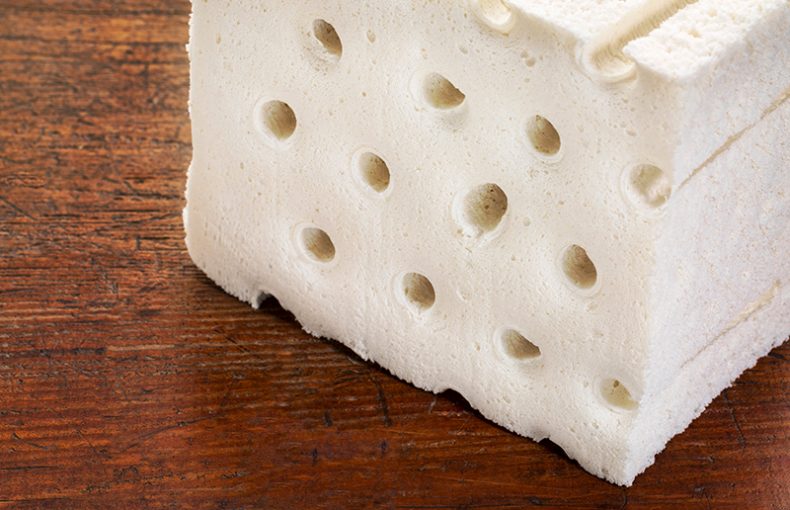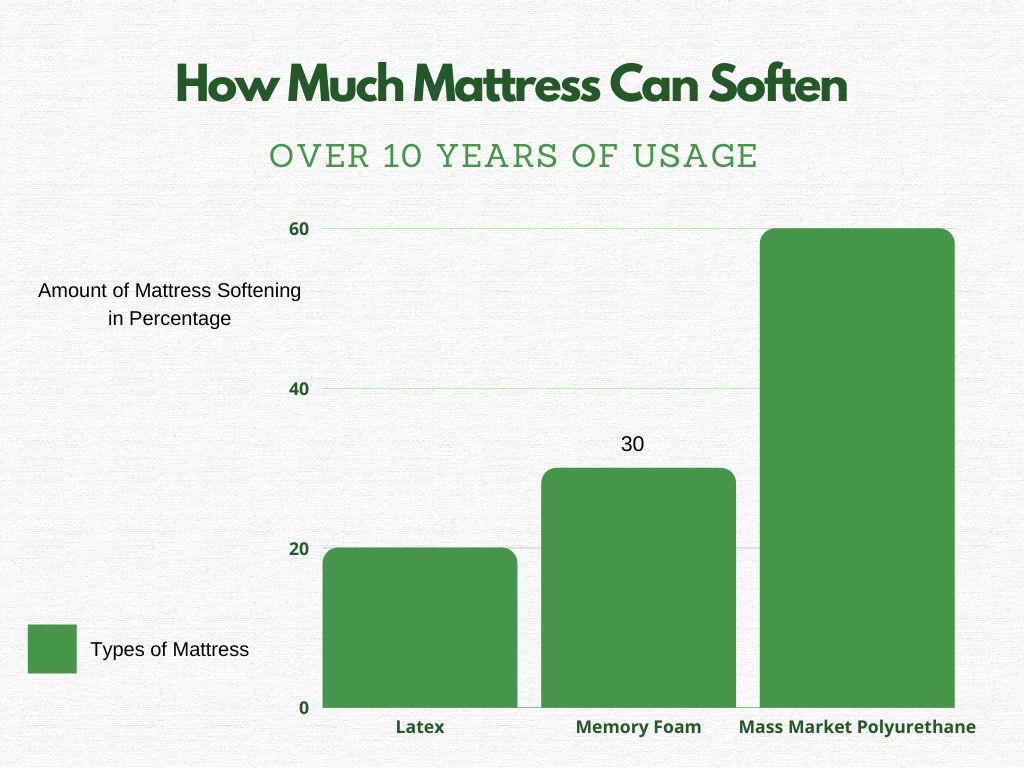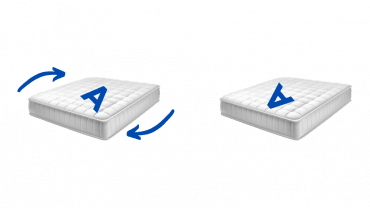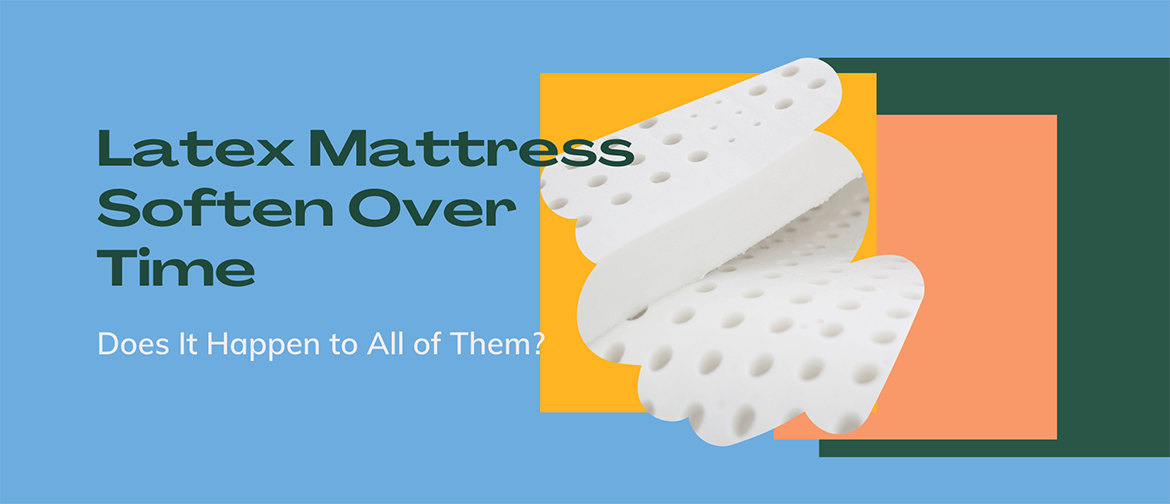A latex mattress is a great investment for people who want a comfortable and healthy sleep surface. However, some people are concerned that the mattress will soften over time and lose its support.
In this blog post, we will explore the issue of latex mattress softening and answer the question: does it happen to all of them?
The truth is all mattresses soften and sag over time. Even concrete will weaken over time.
“If you want to have a good sleep, you have to have a good mattress”
JONATHAN SCOTT
What is a latex mattress and what are its benefits ?
A latex mattress is a type of mattress that is made from natural latex material. Latex mattresses are popular because they offer a number of health benefits, including:

-They are toxin-free, which means they don’t contain any harmful chemicals or metals.
-They are anti-microbial, which means they can resist mold, mildew, and dust mites.
-They are hypoallergenic, which means they are unlikely to cause allergies or skin irritation.
-They are supportive, which means they can help relieve back pain and other types of pain.
-They are durable, which means they can last for many years.
-They are comfortable, which means they can provide a good night’s sleep.
Despite these benefits, some people are concerned that latex mattresses may soften over time and lose their support. So, does this happen to all latex mattresses? Let’s take a look.
How does a latex mattress soften over time ?
The truth is all mattresses soften and sag over time. Even concrete will weaken over time.
When you get your new latex mattress, it may feel firm at first. But, there will be a break in period. This can last anywhere from 30-60 nights where the cover may stretch and become softer as materials adjust to fit individual body weight types or sleeping positions . The comfort should finally set after this initial adjustment.
After the 30-60 night period, the softening process usually slows down, so your latex mattress should remain comfortable for many years.
Comparing to different mattress types, latex mattresses have been shown to soften less over time. Over a ten year period, latex is estimated to soften 15-20%. Memory foam is estimated to soften 30%. Polyurethane foam will generally soften more over time, about 60%.

There are a few factors that can influence how much a latex mattress will soften over time. These include:
- The type of latex used: There are two main types of latex, Dunlop and Talalay. Dunlop latex is made from 100% natural latex and Talalay latex is made from a blend of natural and synthetic latex. In general, Dunlop latex mattresses are more likely to soften over time than Talalay latex mattresses.
- The density of the mattress: The density of a mattress is a measure of how much latex material is used in the construction of the mattress. In general, the higher the density of the mattress, the less likely it is to soften over time.
- The layer thickness: The thickness of the latex layers in a mattress can also influence how much the mattress will soften over time. In general, thicker layers are less likely to soften than thinner layers.
- The climate: The climate where the mattress is used can also influence how much it will soften over time. In general, mattresses used in warm climates are more likely to soften than those used in cool climates.
- The weight of the user: Heavier people are more likely to cause a mattress to soften over time than lighter people. This is because heavier people put more pressure on the mattress, which can cause the latex to compress and become softer.
- Platform supporting the mattress: If the mattress is not supported properly, then it will be more likely to soften over time. This is because the mattress will have to make up for the missing support, which can cause the latex to compress and become softer. For a strong and reliable bed base, you can’t go wrong with the solid support of a platform bed. Durable wood construction provides sustainability that’s far superior to any box spring, wood slats or thin planks.
All of these factors can influence how much a latex mattress will soften over time.
However, it’s important to remember that not all latex mattresses will soften to the same degree. In general, latex mattresses will soften less than other types of mattresses. This is because latex is a very durable material that is designed to withstand a lot of wear and tear.
So, if you are looking for a mattress that will stay firm for many years, then a latex mattress is a good option.
What can you do if your latex mattress is softening?
Many people enjoy the benefits of latex mattresses, which are known for their durability and support. However, over time, even the best latex mattress can start to soften and lose its shape. If your mattress is beginning to feel softer than usual, there are a few things you can do to firm it up.
- Check the bed frame: First, check to see if the bed frame supporting the mattress is still stable. Replace the broken slats or cross-bars to ensure that the mattress has proper support.
- Place a board under the mattress: This will help to support the mattress and prevent it from sagging.
- Use a mattress topper: A mattress topper is a thin layer of material that can be placed on top of the mattress. This will help to add firmness and support.
- Rotate the mattress 180 degrees from head to foot: This will help to evenly distribute wear and tear, which can prevent the mattress from becoming too soft in one area.

By following these tips, you can help to keep your latex mattress firm and supportive for many years to come. However, if your mattress is still softening and uncomfortable to sleep, it may be time to replace and get a new mattress.
The Bottom Line
All mattresses, including latex, will soften over time. This is a natural process and should not be cause for alarm. However, it is important to properly care for your mattress in order to ensure that it remains comfortable and supportive for years to come.
What have you noticed about your mattress recently? Leave a comment on your experience so far. We’d love to hear from you.







